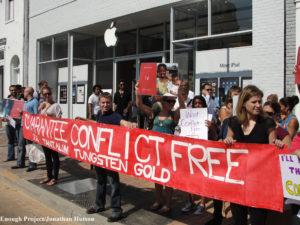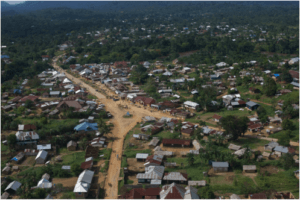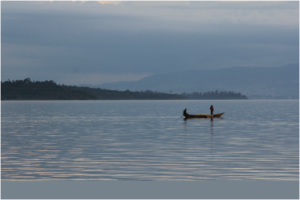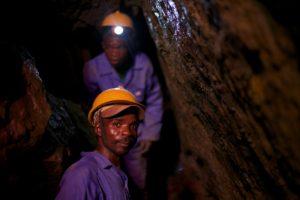The Campaign
 The Conflict-Free Campus Initiative (CFCI) – a joint initiative of the Enough Project and STAND, the student-led movement to end mass atrocities – draws on the power of student leadership and activism to support peace in the Democratic Republic of Congo. By encouraging school officials and stakeholders, both of which are large purchasers of electronics and powerful spokespersons, to commit to measures that pressure electronics companies to invest responsibly in Congo’s minerals sector, students are voicing the demand for conflict-free products from Congo.
The Conflict-Free Campus Initiative (CFCI) – a joint initiative of the Enough Project and STAND, the student-led movement to end mass atrocities – draws on the power of student leadership and activism to support peace in the Democratic Republic of Congo. By encouraging school officials and stakeholders, both of which are large purchasers of electronics and powerful spokespersons, to commit to measures that pressure electronics companies to invest responsibly in Congo’s minerals sector, students are voicing the demand for conflict-free products from Congo.
The goal of this movement is to support peace, accountability, and prosperity in Congo. In order for that to happen, companies must invest responsibly in Congo’s mining sector, not resort to sourcing their minerals elsewhere. With companies like Intel, Apple, Motorola, and others leading the way, we’ve seen a significant increase in corporate commitments to supporting the development of economic opportunity in the region. But much work remains. We must continue to call for additional mining reforms, especially for gold, and for investment in livelihood projects for Congolese mining communities who are impacted by market shifts and in-region reforms.
Sign up now to make your school conflict-free.
Not a student but still want to get involved? Click here to learn about making your city or state conflict-free!
Why Congo?
 The armed conflict in the Democratic Republic of Congo began in the early 1990s and has its roots in the Rwandan genocide. The conflict has resulted in severe and ongoing gross human rights violations, particularly sexual violence. It is the world’s deadliest conflict since World War II, with over 5.4 million people dead and more than 2 million displaced. Despite its abundant natural resources, Congo is ranked among the lowest countries on the United Nations Human Development Index. It is also home to one of the largest U.N. peacekeeping missions in the world, MONUSCO. Armed groups have used widespread rape and child soldier recruitment to instill fear among civilians, gain territory and wealth, and fracture communities. This crisis continues as a central component of armed attacks in eastern Congo.
The armed conflict in the Democratic Republic of Congo began in the early 1990s and has its roots in the Rwandan genocide. The conflict has resulted in severe and ongoing gross human rights violations, particularly sexual violence. It is the world’s deadliest conflict since World War II, with over 5.4 million people dead and more than 2 million displaced. Despite its abundant natural resources, Congo is ranked among the lowest countries on the United Nations Human Development Index. It is also home to one of the largest U.N. peacekeeping missions in the world, MONUSCO. Armed groups have used widespread rape and child soldier recruitment to instill fear among civilians, gain territory and wealth, and fracture communities. This crisis continues as a central component of armed attacks in eastern Congo.
There is no longer a major Rwandan-backed armed group in eastern Congo. The most recently active one, M23, was defeated in November 2013 thanks in part to major international pressure on Rwanda and peacekeeping operations by the Congolese army and the United Nations Force Intervention Brigade. One of Congo’s most notorious warlords and former head of the M23, Bosco “The Terminator” Ntaganda, surrendered to US officials and is now facing charges of war crimes and crimes against humanity at the International Criminal Court. However, serious problems remain. The FDLR rebel group continues to pose a significant threat to civilian populations and regional security, and thrives on illegal charcoal and gold trades in Congo.
 Congo was due to hold elections in late 2016, which would have marked the first peaceful democratic transition of power in Congo’s history. Following a series of delay tactics, including violent crackdowns on public demonstrations supporting elections and pro-democracy youth organizations, elections were never held. Repression continued, and a series of negotiations aiming to develop a transition strategy floundered. Fifteen minutes before midnight on New Year’s Eve 2016, an agreement was signed that, if implemented, would help pave the way for a peaceful transition. However, it remains likely that President Joseph Kabila will obstruct implementation of the deal.
Congo was due to hold elections in late 2016, which would have marked the first peaceful democratic transition of power in Congo’s history. Following a series of delay tactics, including violent crackdowns on public demonstrations supporting elections and pro-democracy youth organizations, elections were never held. Repression continued, and a series of negotiations aiming to develop a transition strategy floundered. Fifteen minutes before midnight on New Year’s Eve 2016, an agreement was signed that, if implemented, would help pave the way for a peaceful transition. However, it remains likely that President Joseph Kabila will obstruct implementation of the deal.
It is crucial to build on this fragile progress. More work must be done to cut off financial support to armed groups and corrupt officials in order to support Congo in having fair, timely elections. Military operations must be accompanied by a more effective disarmament and reintegration program for former fighters. More is also needed to combat the impunity that surrounds atrocity crimes, especially sexual violence, and peace processes must be made more inclusive of the voices of women and other civil society groups. More must be done to accompany the progress made on eliminating the profits armed groups earn from conflict minerals. Livelihood programs are needed for mining communities, and additional gold, mining, and governance reforms are needed in Congo and region
Why Minerals?
 Conflict minerals have fueled and continue to sustain armed violence in eastern Democratic Republic of Congo, linking them to the deadliest conflict globally since World War II. The four conflict minerals (gold, along with tin, tantalum, and tungsten, the “3Ts”) are not the only source of income to armed groups, but they are some of the most lucrative. The illegal exploitation of natural resources today is a manifestation of the mass corruption linked to violence that has marked successive governments in Kinshasa and the broader region since colonial times.
Conflict minerals have fueled and continue to sustain armed violence in eastern Democratic Republic of Congo, linking them to the deadliest conflict globally since World War II. The four conflict minerals (gold, along with tin, tantalum, and tungsten, the “3Ts”) are not the only source of income to armed groups, but they are some of the most lucrative. The illegal exploitation of natural resources today is a manifestation of the mass corruption linked to violence that has marked successive governments in Kinshasa and the broader region since colonial times.
 A growing consumer movement for conflict-free products including U.S. legislation (Section 1502 of the Dodd-Frank Wall Street Reform and Consumer Protection Act), along with other reforms, has made it more difficult for armed groups to generate revenue in particular from the 3Ts, and played a role in Intel’s release in 2014 of the first-ever verifiably conflict-free product, a microprocessor, containing minerals sourced from Congo. Other companies leading efforts to break the links between electronics products and violence in Congo are Motorola Solutions, Apple, Philips, and HP.
A growing consumer movement for conflict-free products including U.S. legislation (Section 1502 of the Dodd-Frank Wall Street Reform and Consumer Protection Act), along with other reforms, has made it more difficult for armed groups to generate revenue in particular from the 3Ts, and played a role in Intel’s release in 2014 of the first-ever verifiably conflict-free product, a microprocessor, containing minerals sourced from Congo. Other companies leading efforts to break the links between electronics products and violence in Congo are Motorola Solutions, Apple, Philips, and HP.
Dodd-Frank 1502 must be fully implemented and strengthened with livelihood projects and other support to mining communities. And consumers must continue to call for conflict-free products made with minerals from Congo so that companies are motivated by consumer demand.
Why Electronics?
Conflict minerals are used in a variety of products – from jewelry to cars. However, the electronics industry is one of the largest purchasers of these minerals. By committing to trace their supply chains and make sure their minerals are coming from mines in the Democratic Republic of Congo where violence is not present, otherwise known as ‘conflict-free’ or ‘green’ mines, electronics companies can interrupt the flow of money that goes to armed groups.
The electronics industry will not be able to support a fully conflict-free trade in Congo on its own, but their far-reaching presence in the minerals sector means they have the opportunity to set an example and encourage other industries to join them.
Why Schools?
Electronics companies like Intel, HP, and Apple are all very concerned about making their products appealing to young people, especially students. They pay attention to whether you buy an iPhone or an Android before you head off to college, and whether you use a Dell laptop or a MacBook to take notes in class. Additionally, schools buy a significant number of electronics products every year – to stock computer labs, library equipment, academic and administrative departments, etc. When companies hear that students care about conflict-free and that schools are actually changing their policies to favor conflict-free products, those companies take note. As a result, companies are beginning to change their practices so they don’t lose this huge segment of their consumer market.

